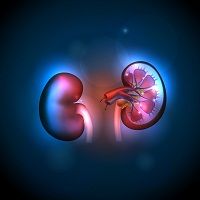Article
Plant-Based Diet Linked to Lower Risk of Chronic Kidney Disease
Author(s):
A healthy plant-based diet can reduce a person's risk of developing CKD by 14% and can also help slow the decline of kidney function, according to a new study.

Adhering to a diet high in fruits, vegetables, whole grains, and nuts could reduce could lower a person’s risk of developing chronic kidney disease (CKD) and slow the decline kidney function.
After analyses, investigators found that those with the highest adherence to a healthy plant-based diet had a 14% lower risk of developing CKD.
Investigators sought to examine the associations between plant-based diets and incident chronic kidney disease, and also to examine changes in kidney function over 20 years in a general population. Using the Atherosclerosis Risk in Communities (ARIC) study, they identified a community-based cohort of 15,792 middle-aged adults without CKD.
Investigators excluded several groups of participants including those with implausibly low or high total energy intake, missing information on dietary intake, and those whose ethnicity was other than black or white. A total of 14,686 were included in the study.
At baseline and visit 3, trained interviewers administer a modified semi quantitative Willett food frequency questionnaire to assess the usual intake of foods and beverages. Investigators constructed an overall plant-based diet index, a healthy plant-based diet index, a less healthy plant-based diet index, and a pro-vegeterian diet index on the basis of responses on the questionnaire.
Investigators calculated eGFR using the 2009 CKD Epidemiology Collaboration equation and used a composite definition to ascertain incident CKD. Incident CKD was defined as: eGFR, 60 ml/min per 1.73 m2, accompanied by 25% or greater eGFR decline at any study visits relative to baseline; kidney-disease related hospitalizations or deaths according to codes from the International Classification of Disease Ninth and Tenth Revisions; and end-stage kidney disease, defined as either dialysis or transplantation.
To examine the associations between plant-based diets and incident CKD, investigators created 3 nested Cox proportional hazards models using length of follow-up time as the time metric. Model 1 adjusted for total energy intake, age, sex, and a combined term for race and study center. Model 2 adjusted for socioeconomic status and health behaviors. Model 3 adjusted for potential mediators.
During a median follow-up of 24 years, a total of 4343 incident CKD events occurred. In model 2, those in the highest quintile of healthy plant-based diet had a 14% lower risk of CKD and those in the highest quintile of pro-vegetarian had a 10% lower risk compared with those in the lowest quintile. Those in the highest quintile of less healthy plant-based diet had an 11% greater risk of CKD.
Investigators noted that, in model 2, slower annual eGFR decline was observed in those in the highest quintiles of overall plant-based diet and healthy plant-based diet compared with those in the lowest quintiles. Investigators added that higher intake of legumes was associated with a lower risk of CKD, while consumption of meats or sugar-sweetened beverages was associated with an elevated risk.
In their conclusion, authors wrote that higher adherence to a healthy plant-based
diet or a pro-vegetarian diet was associated with lower CKD risk, whereas adherence to a less healthy plant-based diet was associated with higher risk, independent of sociodemographic
factors and health behaviors.
“For kidney disease risk, it appears to be important to choose healthy options for plant sources of food, including fruits, vegetables, whole grains, nuts, and legumes,” said study author Casey Rebholz, PhD, of the Johns Hopkins Bloomberg School of Public Health. “Also, our finding of a significant interaction by weight status at baseline suggests that following a healthy eating pattern may be particularly beneficial before becoming overweight or obese.”
This study, titled “Plant-Based Diets and Incident CKD and Kidney Function,” is published in the Clinical Journal of American Society of Nephrology.


